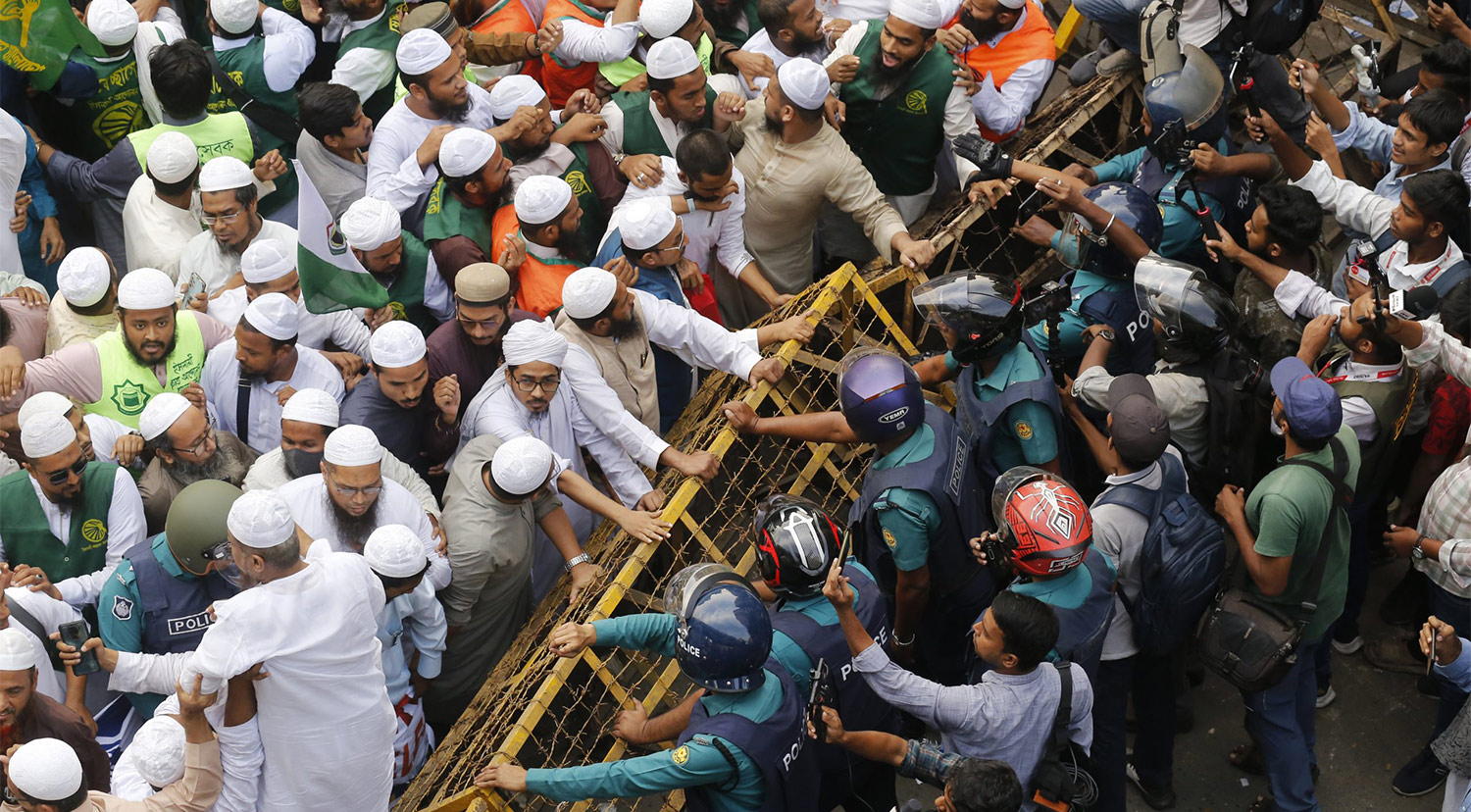Bangladesh is at a tipping point. Here are the scenarios for a contentious election season.

After a long hiatus, violence and street agitations are back in full swing in Bangladesh ahead of the scheduled general elections in January 2024. As the government and the opposition are in a face-off situation and there is no immediate resolution in sight, it is pertinent to ask whether Bangladeshi politics has reached a tipping point.
Since October 28, after the grand rally of the opposition Bangladesh Nationalist Party (BNP) was dispersed with force by law enforcement agencies, the country has entered a spiral of violence which further intensified after the country’s election commission announced the poll date as January 7, 2024. The announcement was made on November 15, after the ruling party dismissed the call from US Assistant Secretary of State for South and Central Asian Affairs Donald Lu on November 13 for “unconditional dialogue” among three major parties. The opposition parties demand the resignation of Prime Minister Sheikh Hasina’s government and the installation of a neutral government to oversee the 2024 election. They have called for hartal (general strike) and blockades throughout the country in recent weeks and have continued to do so after the poll schedule was announced. Violence has been reported from across the country; as of November 13, at least thirteen people have died in the violence, and hundreds, including thirty journalists, have been injured. Although the government claims that the violence is being perpetrated by opposition activists, a statement from the Office of the United Nations High Commissioner for Human Rights noted that journalists were assaulted on October 28 by “masked individuals riding on motorcycles, who are thought to have been ruling party supporters.” During the blockades and hartal called by the opposition, incidents of arson on buses in the major cities have taken place despite police presence in full gear.
The government, which began arresting the BNP leaders in the days ahead of the rally, has embarked on a full-scale crackdown of the opposition since then. Almost all the BNP central leaders, including the party’s secretary general, Mirza Fakhrul Islam Alamgir, have been arrested and charged with arson, damage to state property, and violence against members of law enforcement agencies. Thousands of opposition activists have been arrested, and the government appears to have plans for harsher clampdowns on the grassroots of the BNP. The party headquarters has been sealed by the police, which claim that the office is a crime scene following the clashes on October 28.
Bangladesh’s slide toward autocracy
Hasina came to power in 2009 in an election held under a caretaker government backed by the military and was elected twice since in elections that international observers said were seriously flawed. The 2014 election was boycotted by all opposition parties after the ruling party removed the caretaker government provision from the constitution in 2011. Although opposition parties participated in the 2018 election, media reports revealed that in some places the votes were cast the night before, and that many voters were barred from voting.
As the ruling Bangladesh Awami League (BAL) established its control over the administration, law enforcement agencies have enacted a series of laws to muzzle freedom of expression since 2014, most notably the Digital Security Act of 2018. And as a compromised judiciary failed to act, the country incrementally slid toward becoming an elected autocracy. The impunity enjoyed by BAL activists and the support of the business community exacerbated the situation.
The opposition parties, meanwhile, remained fragmented. The main opposition party, the BNP, became seriously handicapped due to the absence of its chairperson, Khaleda Zia, who was convicted on dubious graft charges in early 2018, sentenced to ten years in prison, and is currently under house arrest. This caused the party to become organizationally weak and lack a cohesive direction. However, as the country began to experience serious economic turmoil in July 2022, with a depleting foreign reserve, an energy crisis, high inflation, and a balance of payment crisis, people began to take to the streets. The BNP had by then revitalized its grassroots and began a series of public rallies around the country and at the capital, Dhaka.
The international response
Despite this incremental progress toward autocracy, Bangladesh’s domestic politics drew little attention from international actors until late 2021, when the US Treasury Department imposed sanctions on the country’s elite force Rapid Action Battalion and seven of its former and current officials for egregious violations of human rights and the State Department imposed sanctions on two high-ranking police officials. This was combined with the Biden administration’s decision not to invite Bangladesh to the virtual Summit of Democracy, which the United States hosted in November 2021.
US officials have continued to impress upon the Bangladeshi government the need to create a conducive environment for elections. In May 2023, for example, the US government enacted a new “Visa Policy to Promote Democratic Elections in Bangladesh,” which included the denial of visas to those engaged in undermining the “democratic election process.” In September of this year, the United States announced that it is taking steps to implement the new visa policy.
The Bangladeshi government blasted US statements stressing the importance of free, fair, and inclusive elections as meddling in domestic politics. On the other hand, US support for a democratic election energized the opposition, boosting the morale of activists. China and Russia, which have become close allies of the Hasina government, have sided with her. India, Hasina’s principal backer, after maintaining silence for a long time, expressed support for her. In the past months, two pre-election exploratory missions, conducted by the European Union (EU) and a bipartisan group from the United States, have indicated that the country’s political environment is not conducive to an inclusive election. The EU decided that it will not deploy a full election observer team, citing the absence of “necessary conditions,” while the US team, comprised of representatives of the International Republican Institute and the National Democratic Institute said “the current political environment presents significant obstacles to electoral integrity.” The latter report underscored the importance of the upcoming election, saying that, “Bangladesh is at a crossroads and the upcoming elections provide a litmus test of the country’s commitment to a democratic, participatory, and competitive political process.”
The United States and seven other countries expressed deep concerns in a joint statement after the violence of October 28. The statement was signed among others by two Asian countries, Japan and South Korea, major economic partners of Bangladesh. The EU has expressed concerns too. As the clampdown started, various human rights groups such as Amnesty International and Human Rights Watch have condemned the government’s actions. Stéphane Dujarric, a spokesperson for the United Nations secretary-general, spoke out against “harassment or arbitrary arrest.” High Representative of the EU for Foreign Affairs and Security Policy Josep Borrell also expressed concerns over the arrests of the opposition activists.
It is against this background that the election commission announced the schedule which indicates that the ruling party intends to forge ahead unilaterally. However, the situation is still in flux and Bangladesh is faced with two possible scenarios in the coming months. The scenarios are based on the understanding that the ruling BAL will try to secure a victory at any cost, and that international actors, especially the United States, have a role to play. Under the first scenario, a non-inclusive election will be held under the present system with the BAL in power, while in the second scenario, a negotiated settlement will be reached, which may allow the election to be deferred. Each scenario has three pathways.
Scenario 1: The government has the upper hand; a unilateral election takes place
Pathway 1: The ruling party succeeds in exhausting the BNP and other opposition parties in their efforts to continue the movement. The 2015 scenario emerges—this is apparently what the government is betting on. Consequently, the local leaders of various parties are likely to join the election as independent candidates. A dejected BNP loses its ground resulting in a low turnout but somewhat “participatory” election.
Pathway 2: The BAL flips some high-profile leaders of the BNP in custody to join “king’s parties,” which creates a fracture in the BNP. Leaders of other parties are targeted and either accused of being involved in violence or pressured to join the election rather than boycott it. These results create enough confusion to pave the way for an “inclusive” election. Islamist parties, particularly the Bangladesh Islami Andolon and the Hefazate Islam, emerge as key players.
Pathway 3: The BAL renders the BNP leaderless and disbands it ahead or immediately after holding a unilateral election (or making all the BNP candidates ineligible to file nominations). The BAL holds a well-engineered election with some violence to provide the aura of a regular Bangladeshi election, with multiple candidates from the ruling party and its allies participating, providing a few seats to “king’s parties” and the Jatiya Party.
As of November 15, the measures taken by the government are pushing the country toward this first scenario, but each pathway poses serious challenges.
Scenario 2: The opposition has the upper hand; a negotiated inclusive election takes place
Pathway 1: The opposition succeeds in transforming its currently quiet public support into popular mobilization and unnerves the police and civil administration. The business community feels the pressure. Cracks emerge within the power bloc, forcing the government either to fall or to find a negotiated settlement.
Pathway 2: The opposition finds different ways to put pressure on the government besides the blockades and hartals. And/or the economic situation takes a sudden precipitous downturn forcing people to take to the streets.
Pathway 3: External actors, particularly the United States, take punitive measures, including targeted sanctions, which will affect the ruling party’s support base, or the state institutions, weakening the resolve of the government. And/or external actors take an active mediating role.
Bangladeshi politics has entered a time of grave uncertainty; how the election will be held and what kind of future lies ahead will be decided in the coming weeks. The country has reached the tipping point. It is at this critical juncture that the international community, particularly the United States, needs to play a robust role in ensuring what Washington committed to in the announcement of the Visa Policy on May 23, 2023—lending “support to all those seeking to advance democracy in Bangladesh” and helping to hold “free and fair elections.” The US sanctions on the Rapid Action Battalion in December 2021 dramatically reduced the number of extrajudicial killings and saved many lives; it is time to think of equivalent measures to stop Bangladesh from spiraling toward a closed autocracy.
ABOUT AUTHOR: Ali Riaz is a nonresident senior fellow at the Atlantic Council South Asia Center and a distinguished professor at Illinois State University.
Source By : Atlantic Council

